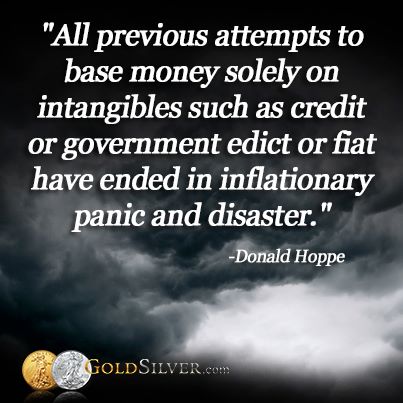Politicization, Currencies & Gold: The Lost Battle of Central Banks
Commodities / Gold and Silver 2013 Feb 06, 2013 - 08:44 AM GMTBy: GoldSilver
 Central banks have many losing battles ahead.
Central banks have many losing battles ahead.
The world finds itself immersed in the depths of an economic crisis. This crisis however, is unlike any other experienced in recent history. What is at stake is the very foundation of our monetary system, the currency.
Today's unbacked fiat currency experiment is at the very root of an emerging global monetary problem. While the talk of "recovery" in recent months now populates headlines, the desperate actions of politicians and central bankers show the contrary.
More than ever, this saying applies: "Do not believe what they say, rather observe the actions of those who say it".
Since the onset of the "Great Recession", we have witnessed a spectacular 'dead cat bounce' in everything from stocks to real estate markets. This is undoubtedly attributable to the unprecedented currency debasement (currency expansion) launched by central banks, in addition to an explosion in government spending aimed at counter-acting the inevitable.
Since 2008, the Federal Reserve has more than tripled its balance sheet, while the US national debt has just about doubled in the same time frame. As central banks attempt to provide life support to an ailing system, the eventual outcome is evident. A system based on the unsustainable cannot be spared, as the problem itself lies in the medium of exchange which facilitates all economic activity: the unbacked fiat currency.
Recently, surfacing evidence of decelerating growth in the United States, the permanent tensions in the Eurozone, and Japan's deteriorating economic environment are but a few examples of the events that have triggered governments to move beyond their traditional spheres of influence and into the business of monetary policy. A flashing indicator that the so called 'recovery' is all but real.
Central banks across the globe have come under the influence of their respective governments like never before.

To be clear, these institutions are under siege in a battle that, by definition, they tend to lose : the battle of politicization.
Under a political methodology, a policy conflicting with government interests must be quickly altered. In today's environment, central bank mandates are falling under question by political forces who pose a short-minded resolution through limitless credit expansion (currency debasement), without thought to long-term consequences (rapid price inflation).
The latest victim of this reckless mindset was the Bank of Japan (BoJ).
Just weeks ago, the newly elected Japanese prime minister (Shinzo Abe) threatened the Bank of Japan's autonomy unless they alter their mandate by doubling their inflation target and committing to unlimited printing.
Consequently the BoJ recently announced a more aggressive stance focusing on open-ended asset purchases without a specified limit, a close reflection of the Federal Reserve's QE4 program launched in December 2012. Japan took this even further, and unlike the Fed, did not set specific parameters as to when to stop easing. Thus, it seems that Shinzo Abe's intent of limitless currency creation was accomplished without much struggle.
The Bank of Japan however, is not alone.
Jens Weidmann, President of Germany's central bank (The Bundesbank), has recently warned of the dangers of central bank politicization, claiming that this will eventually trigger a currency war (Race to Debase). Under such a scenario, every nation (claiming price 'competitiveness' as a justification) prints as fast as possible, increasing demand for its exports, while crushing the purchasing power of fiat currency savers and citizens at home.
This is nothing new to the global economy, but the tendency will accelerate with governments putting more pressure on central banks. As history proves, short-term minded politicians typically wreck an economy's long term prospects, as their visibility rarely goes beyond their election cycle.
Weidmann's statements note that among the reasons for Germany recently repatriating their gold from Paris and New York, the Bundesbank has considered the costs and implications of a currency war. It is all too clear to the German central bank that whether they like it or not, currency debasement quickly becomes a game of forced participation. One by one, they will fall like a domino effect.
This will be a significant price and demand catalyst for gold and silver.

Just like Germany did, it is just a matter of time before more and more countries demand the return of their gold bullion. No one wants to be left behind in the Race to Debase, much less in another very important race: the rush for monetary assets (gold & silver). Central banks know this very well.
A physical supply shock will eventually cause gold and silver prices to sky rocket as physical shortages are exposed and chains of re-hypothecated gold and silver collapse (via ETFs, pools, certificates, and paper gold / paper silver accounts).
Take note, today central banks face a series of lost battles ahead.
The politicization of currency and gold will offset an increasing set of consequences for paper fiat currencies. The consequences of this will be substantial, transferring wealth away from those who have not yet protected themselves with physical gold and silver bullion.
Mike Maloney is the owner and founder of GoldSilver.com, an online precious metals dealership that specializes in delivery of gold and silver to a customer's doorstep, arranges for special secured storage, or for placement in one's IRA account. Additionally, GoldSilver.com provides invaluable research and commentary for its clients, assisting them in their wealth building endeavors.
© 2013 Copyright GoldSilver - All Rights Reserved Disclaimer: The above is a matter of opinion provided for general information purposes only and is not intended as investment advice. Information and analysis above are derived from sources and utilising methods believed to be reliable, but we cannot accept responsibility for any losses you may incur as a result of this analysis. Individuals should consult with their personal financial advisors.
© 2005-2022 http://www.MarketOracle.co.uk - The Market Oracle is a FREE Daily Financial Markets Analysis & Forecasting online publication.



